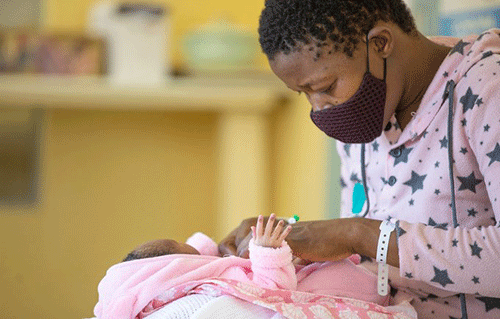Health minister Dr Kalumbi Shangula has said the country continues to record high numbers of underage pregnancies.
“For the 2020/2021 and 2021/2022 financial years, teenage pregnancies stood at 14.54% and 14.95% respectively nationally, translating to more than 15 000 pregnancies among teenagers per year,” said Shangula yesterday while speaking during the donation of contraceptives and reproductive health equipment in Windhoek.
Shangula stated during 2020/2021 the regions with the highest ratio of teenage pregnancies are Kavango West (24.3%), Kunene (22.4%) and Kavango East (21.1%), while the lowest are Khomas (7.76%), Erongo (8.78%) and Oshana (9.6%).
“For the 2021/2022 financial year, the regions with the highest pregnancy ratio are Kavango West (23.9%), Kunene (22.9%) and Kavango East (21.1%), while the lowest are Khomas (7.4%), Erongo (8.9%) and //Kharas (9.8%),” he expanded.
Shangula said not only do unplanned pregnancies disrupt the education trajectory of these young people but they may also give rise to other negative results such as infection with sexually transmitted infections.
“There is also a risk of injuries during birth as the bodies of underage girls, may not be fully developed. Many young women, after falling pregnant, suffer depression and may develop other health-related complications, such as miscarriages,” he said.
He said too often, many young people who fall pregnant end up attempting unsafe and illegal termination of pregnancies, resulting in injuries and even death.
“At society and national levels, maternal mortality rates may soar, for example, for young girls who have not developed enough to carry a pregnancy safely or for women with underlying medical conditions,” said Shangula.
The United Nations Population Fund (UNFPA) said obstetric haemorrhage, eclampsia, obstructed labour and unsafe abortion are major complications of pregnancy and childbirth causing maternal mortality in Namibia. UNFPA adds that access to healthcare remains a challenge, particularly for women as they experience distance-related challenges to access health facilities.
“In some settings, young women who fall pregnant, may be forced to get married, marriages that they are not ready for. They may also be compelled to leave school, imperilling their education and their future.”
He underscored the importance of providing young people with education on issues of contraceptives so that they can make informed choices and decisions when they decide to seek these services.
Development partner in this venture, the Japanese government funded around US$463 000 (N$8 million) for the Leaving No One Behind project, through UNFPA, to contribute to the combating of gender-based violence (GBV) and as an emergency response intervention in the context of Covid-19.
The project focuses on those farthest left behind, including vulnerable women and girls, particularly those living with disabilities, pregnant and lactating women, in and out-of-school youth and other groups susceptible to sexual and gender-based violence.
“This assistance aims to advance nation building through empowerment and protection of individuals to live happily and in dignity and has been incorporated into important international visions such as Universal Health Coverage in the context of Leaving No One Behind,” said Japanese embassy chargé d’affaires Noriaki Sadamoto
- psiririka@nepc.com.na


